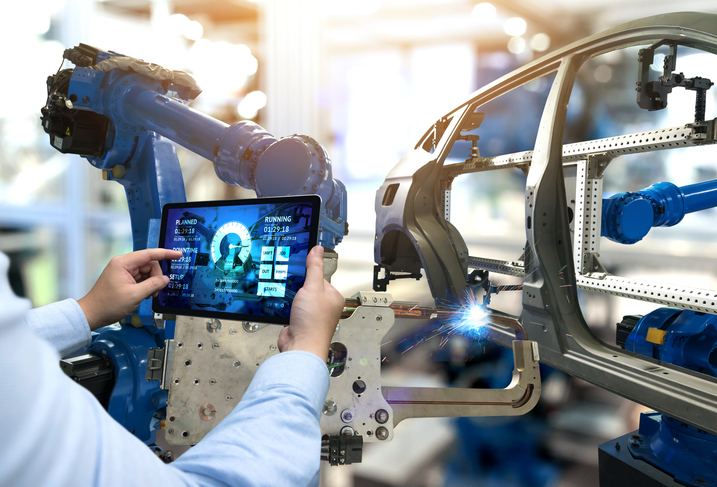The concept of “smart factories” has emerged as a game changer in the manufacturing industry, with the global market for smart manufacturing expected to reach $548.14 billion by the end of 2024.1 The technologies in smart factories—such as the Internet of Things (IoT), artificial intelligence (AI), robotics and data analytics—revolutionize the way products are designed, produced and delivered.
This article looks at the immense potential of smart factories and how your organization can embrace smart factory technology to unlock productivity and growth. We will discuss:
- What a smart factory is
- What a smart warehouse is
- The key technologies powering smart factories
- The benefits and competitive edge offered by smart factories
- The critical role of ERP systems in enabling smart factory success
- How cloud ERP systems provide key advantages over on-premise ERP systems

Solving Manufacturing Challenges with Smart Factory-Ready ERP Systems
Discover how ERP systems with smart factory integrated technology help companies overcome common manufacturing challenges.
What is a Smart Factory?
A smart factory is a highly digitized and automated production facility that integrates cutting-edge technologies such as:
- The Internet of Things (IoT)
- Artificial Intelligence (AI)
- Robotics
- Data Analytics
In a smart factory, various components of the production line are connected which allows for real-time communication, data exchange and analysis. The ultimate goal of a smart factory is to achieve:
- Enhanced efficiency
- Increased productivity
- Reduced costs
- Improved quality control
"Making a factory truly ‘smart’ depends on its ability to react almost immediately to fast-changing consumer demand for speed and product customization. This means it will need to have the talent and the technology in place to enact fast, flexible and agile production at scale, and in line with customers’ unique requirements."
The Manufacturer
Benefits of Smart Factory Technology
1. Increased Efficiency and Productivity
One of the major benefits of a smart factory is streamlining processes and optimizing resource utilization. Automation and real-time data analysis, enabled by smart factory technology, allows your organization to:
- Identify and eliminate bottlenecks
- Reduce human errors
- Maximize output with minimal resources
Furthermore, your organization is empowered with predictive maintenance capabilities that allow for proactive decision-making, ensuring optimal utilization of machines and preventing costly breakdowns. The end product of increased efficiency in your organization is increased productivity and minimized operational costs. Companies report 10-12 percent gains in manufacturing output, factory utilization and labor productivity after investing in smart factory initiatives.3
2. Reduced Downtime
In the manufacturing sector, unplanned downtime can be a significant hurdle that results in lost production time and revenue. Smart factories address this challenge head-on by leveraging advanced predictive maintenance and remote monitoring capabilities, allowing you to continuously monitor equipment performance and analyze data streams. This allows your organization to identify potential issues before they escalate into major breakdowns. This proactive approach minimizes unplanned downtime, optimizing production schedules and ensuring smooth, uninterrupted operations.

3. Improved Quality Control
Smart factories integrate sensors and IoT devices throughout your production line allowing your company to capture real-time data on various parameters such as temperature, pressure and quality metrics. This data can then be analyzed to identify deviations and trigger immediate corrective actions, ensuring consistent product quality that meets your customers’ expectations. Furthermore in smart factories, the end-to-end traceability feature makes it easier to identify and rectify any quality issues throughout your supply chain.
4. Enhanced Worker Safety
Smart factories leverage automation and robotics, reducing the reliance on manual labor for hazardous tasks. Collaborative robots (cobots), work alongside your human employees, taking over repetitive or dangerous tasks, improving worker safety. This in turn enhances overall operational efficiency, creating a win-win scenario for you and your employees.
5. Improved Agility and Flexibility
Your organization must be agile and adaptable in order to meet ever-changing customer demands. Smart factories facilitate rapid reconfiguration and customization of production lines, enabling greater agility. Your organization can quickly identify market trends and adjust production schedules accordingly because of the constant flow of real-time data and insights. This flexibility allows your organization to respond swiftly to customer demands, gaining a competitive edge in the market and staying ahead of the curve.
Ready to start your digital transformation journey?
Click the button below to request your free discovery call.

Key Technologies in Smart Factories
1. Industrial Internet of Things (IIoT)
The Industrial Internet of Things (IIoT) is one of the foundational pillars of smart factories and is a network of interconnected devices embedded with sensors, software and connectivity. IIoT enables the collection and exchange of real-time data from machines, parts, processes, and other equipment throughout the manufacturing process.
IIoT devices are the eyes and ears of your factory, constantly monitoring and capturing valuable insights into machine performance, production cycles and environmental conditions. IIoT provides your organization with a comprehensive view of your operations, allowing you to identify bottlenecks, optimize maintenance schedules and promptly address potential issues before they escalate into costly downtime.
2. Artificial Intelligence (AI) and Machine Learning (ML)
Artificial Intelligence (AI) and Machine Learning (ML) technologies can analyze vast amounts of data, identifying patterns and trends that would be virtually impossible for human analysts to detect. Your organization can gain predictive insights into machine performance by leveraging AI and ML, enabling proactive maintenance strategies that minimize unplanned downtime and extend the lifespan of critical equipment.
Furthermore, AI and ML algorithms can be trained on historical data to continuously learn and improve over time, enabling real-time quality control and process optimization. Your company can leverage these technologies to identify defects, anomalies and deviations from predefined quality standards, ensuring that only products meeting the highest standards reach the market. Additionally, AI-powered algorithms can optimize production schedules, resource allocation and supply chain management, resulting in increased efficiency and cost savings.
“The global IoT in manufacturing market size is expected to reach $2114.33 billion by 2031 and exhibit a CAGR of 23.30% in the forecast period (2024−2031).”
Yahoo Finance
3. Robotics and Automation
The integration of robotics and automation—which have been instrumental in the manufacturing sector for decades—with smart factory technologies has taken their capabilities to new levels. Collaborative robots (cobots) are designed to work alongside human workers, taking over repetitive or dangerous tasks with precision and consistency. Cobots help improve worker safety and enhance productivity by freeing up human workers to focus on more complex and value-added tasks such as:
- Product design and development
- Higher-level inspection and quality control
- Customer service and relationship management
- Programming and operation of complex machinery
Industrial robots help with automation of complex processes performing tasks with unparalleled speed, accuracy and repeatability. Integrating robotics and automation into your operations allows your organization to achieve higher levels of productions, quality control and cost-effectiveness.
4. Cloud Computing
Cloud computing technology allows your organization to securely store and analyze the massive amounts of data generated by IoT devices, production lines and other sources, forming a backbone for the success of your smart factory. Cloud-based systems provide real-time access to critical data, enabling seamless collaboration among your teams, regardless of their physical location, empowering you to make informed decisions quickly and adapt to changing market demands with agility.
Furthermore, cloud computing offers unparalleled scalability, allowing your business to easily expand or contract your computing resources as needed, without being limited by on-premises infrastructure. This flexibility is particularly valuable in the manufacturing industry, where demand fluctuations and seasonal variations can significantly impact resource requirements.
The scalability, cost-effectiveness, accessibility, data security and easy updates are some of the major benefits the latest cloud ERP systems offer over legacy on-premise ERP solutions, especially for those businesses contemplating smart factory integrations. Adopting cloud ERP software as your firm transitions to a smart factory allows your organization to stay ahead of the competition, meet customer demands and drive growth in the ever-evolving manufacturing landscape.
Conclusion
Smart factories are revolutionizing the manufacturing sector by leveraging advanced technologies and integrating various components of the production line, allowing your organization to achieve increased efficiency, reduced downtime, improved quality control, enhanced worker safety and improved agility. ERP systems provide improved data integration, enhanced collaboration, increased automation, improved decision-making and reduced costs within the smart factory environment.
Ultra Consultants is an independent ERP selection and implementation firm, specializing in leading organizations like yours through the complex digital transformation process. Then, we help you realize the significant benefits of modern smart factory enterprise technologies and give you the tools to achieve your business goals. We are a 100% independent, industry focused, complete solution provider with an experienced in-house team. We work with you to optimize your business processes, employ a structured approach to reduce your risk and costs, then utilize leading enterprise technologies and today’s best practices to drive improved performance. For more information request a free discovery call today.
Table of Contents
More ERP material...
The Undeniable Benefits of Implementing ERP in Food and Beverage Manufacturing
Data analytics holds the ability to highlight inefficient manufacturing processes and enable…
Emerging Technologies in Manufacturing Driving Business Growth
Data analytics holds the ability to highlight inefficient manufacturing processes and enable…
How Food Production ERP Improves Manufacturing Efficiency
Data analytics holds the ability to highlight inefficient manufacturing processes and enable…



